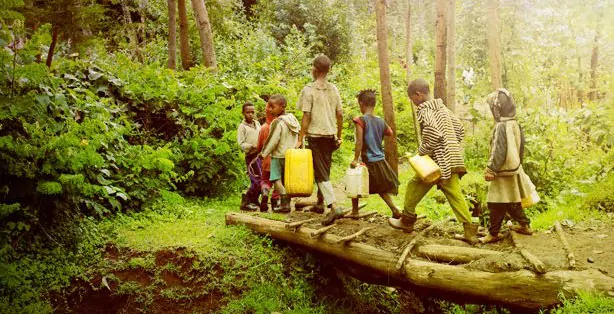
Failure. It can happen despite all efforts to make a difference in people’s lives. God calls us to love our neighbors as ourselves, and yet we can often hurt more than we help. Amanuel Sherifaw faced this dilemma. Through Lifewater International’s WASH (water, sanitation, and hygiene education) trainings, he discovered the importance of engaging the community to traverse the minefield of deeply rooted cultural and behavioral norms.
Once himself a child of destitution in rural Hosanna, Ethiopia, Sherifaw persevered in his educational pursuits through all odds to serve the poorest of the poor as the sanitation field manager of Ethiopian Evangelical Church Mekane Yesus Development and Social Service Commission (DASSC). Armed with UNICEF’s and WHO’s statistics—good sanitation and preventative hygiene combined with clean water reduced diarrhea, the most prevalent killer, by up to 65 percent, whereas clean water alone achieved only a 15-40 percent reduction—he was on a mission to hand out as many latrine kits as possible.
The post-project results were terribly deflating. “We gave out more than 1,000 latrine slabs,” Sherifaw says. “When we went back, we found out that many people had broken up the slabs to get the metal.” Sanitation projects often end up this way. In some instances, project leaders returned to see latrines used as chicken coops or storage sheds. Or even worse, some were kept in pristine condition to display thankfulness. When asked why they never used it, beneficiaries stood shocked, unable to fathom defecating in a gift given to them.
At the onset of a joint project assignment in rural Hosanna with Lifewater, Sherifaw and his staff received trainings called Transformational Community Development and WASH Promotion. Light bulbs went on. “[When] I was working on a previous project in one kebele (community), we did not show them why good sanitation could save their lives,” Sherifaw says. “At that time, even I myself was not changed. We would pile information on them. Go! Go! Go! We just wanted to get it done.”
Understanding cultural and socioeconomic viewpoints and teaching the “why” of the changes Sherifaw’s staff was asking the community to embrace is vital to creating change. This requires an investment of time and fellowship, which Jesus Himself modeled. He lived amongst us listening, inquiring and fellowshiping with the people. He was interested in our transformation, a repositioning of our heart to embrace His vision of what He knew to be for our best interest.
When DASSC set out to determine the most appropriate WASH solutions for the 10 villages around Hosanna, the team created focus groups to gather information from the community members and the government health workers. “I like the focus groups,” Sherifaw says. “We give people a simple direction and then we follow them. We stay quiet and let them lead. One mother told me: ‘The educated ones always guide me, but you are following what I say. This is a new thing. Thank you.’” The focus groups gave incredible insight. The women in one village wanted a reliable source of clean water and a safe way to collect it, but did not want the water source too close. Socializing with one another on the walk to get water was a generations-old tradition to maintain bonds with other families. Another village believed latrines were haunted, largely because decades prior a passing NGO had poorly built one that collapsed on an occupant. Simply installing another one for them would have been futile.
Does this engagement strategy really work? In the joint project, Sherifaw and his team applied the principles learned during the trainings to engage the community. School directors and teachers began mobilizing student WASH clubs to educate students and their families, clean school compounds and construct school latrines and handwashing stations. Many schools painted WASH messages on their walls, such as, “Sanitation is life insurance.”
Because they know their students well, teachers tailored lessons to specific needs. For example, Zauditu, a teacher and WASH club coordinator at Hacmura Primary School, says: “I talk openly with the girls about sanitation, about their monthly periods. I teach them to wash and keep clean and tell them that [with the new latrines] there is no need to stay home during their menstruation. … I have seen them changed by what we teach.” A teacher at the Sundusa School says: “We are teaching one health session per week. It is not boring because there is drama and singing and everyone is participating. I think it is good because if you just say, ‘You have to do this,’ I don’t think they will do it.”
Together with project and government health promoters, kebele managers and other community leaders began efforts among local families. For the first two months of the project, between 10 to 20 households had volunteered themselves from each of the 10 communities to serve as “model households.” There was no financial incentive to do so as each had to pay for materials, build their own latrines and sacrifice time to learn and apply hygiene lessons. “First we simply observed their behavior, then we asked them about possible solutions to risky health practices we saw,” Sherifaw says. “Then we made sure they replaced risky behaviors with healthy ones. We observed the changes, addressed ongoing problems and then used the model households to inspire others to change.”
According to government surveys, the independent baseline survey and the final project evaluation, latrine coverage across the 10 rural communities around Hosanna rose from 61 percent to 97 percent, handwashing at crucial times rose from 26 percent to 98 percent. One kebele, Bobicho, achieved 100 percent latrine coverage and was declared by the Ethiopian government as the nation’s second “Open Defecation Free” community. Acute watery diarrhea in children under 5, which had been the second most fatal health risk to children, plummeted from 63 percent to 4 percent, dropping the disease completely out of the top 10.
When community members are able to teach each other the best methods, real change can take place.
Janet Proby is the hygiene programs specialist for Lifewater International. For a photo slideshow of the Hosanna project and more information, go to Lifewater.org/hosanna-project.






















